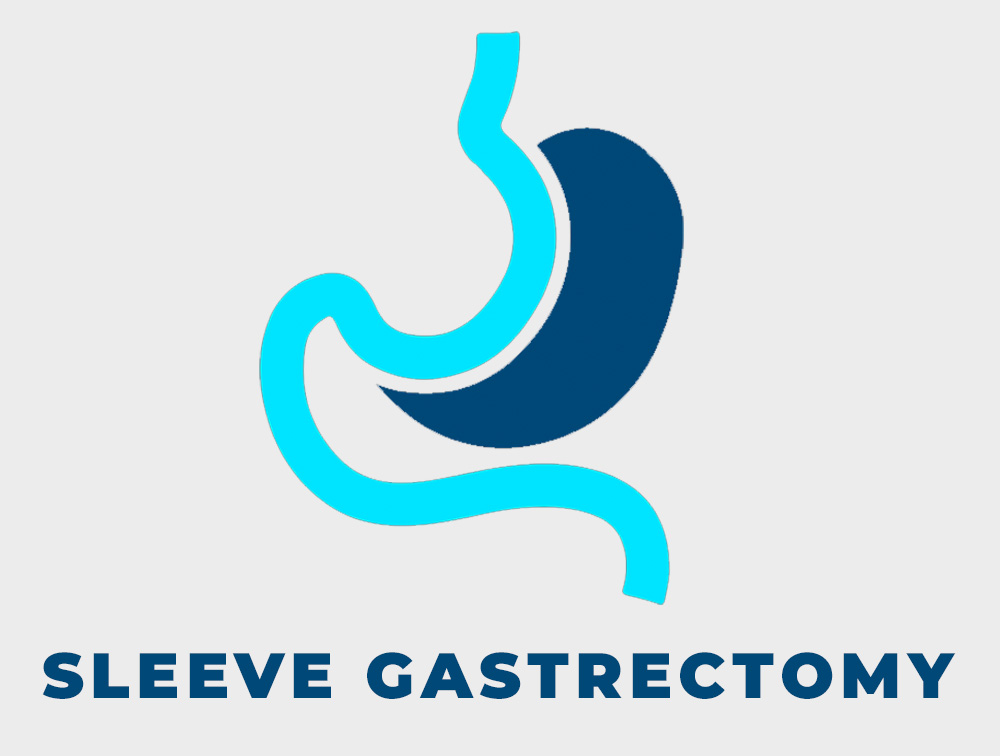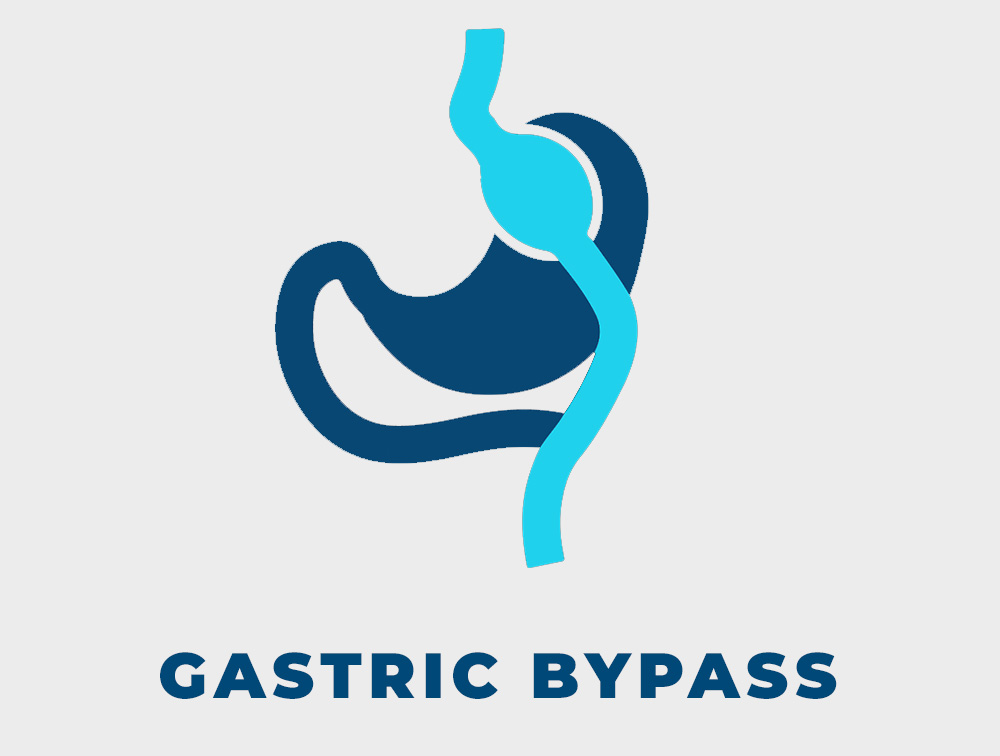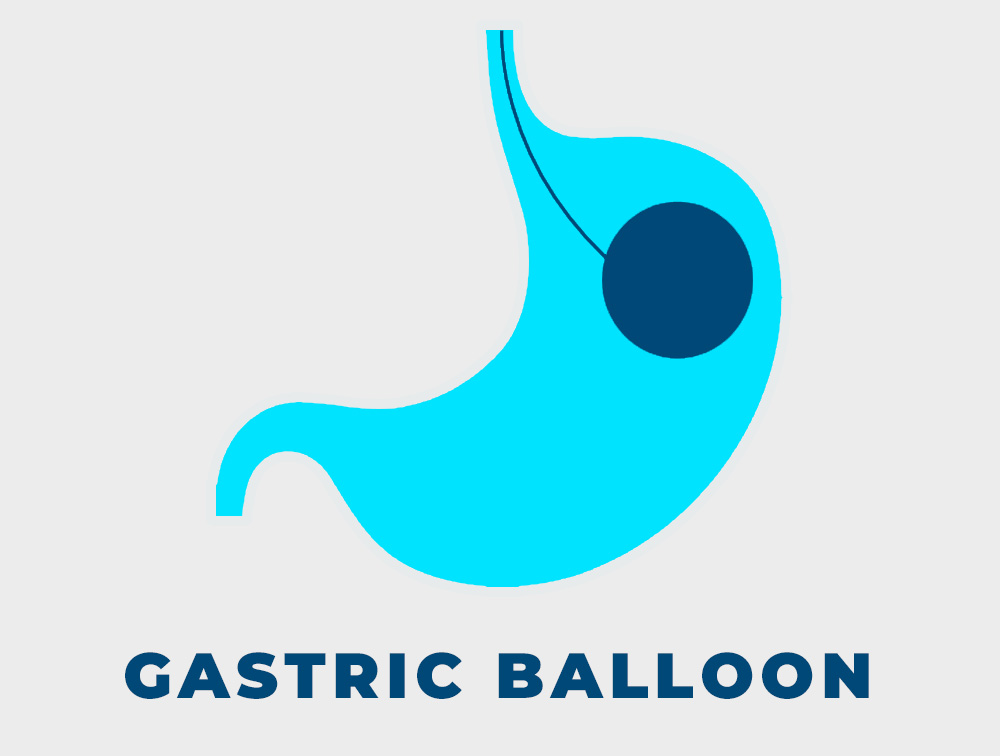BARIATRIC & METABOLIC SURGERY
Obesity is one of the most common health problems in the world in recent years, with the usual consequences of irregular and unhealthy nutrition. If we want to reveal the seriousness of the event, let’s examine the 2017 data together. 13% of adults worldwide are obese while 39% are overweight. In addition, 8% of global deaths in 2017 are attributed to obesity. The reason why we are talking about these is not to make you feel depressed, many people like you suffer from this problem, but there is a difference, you have taken the first step while reading this article.
The definition of obese is based on the World Health Organization’s body mass index. An individual with a BMI between 25.0 and 30.0 is considered “overweight”; A BMI greater than 30.0 is defined as ‘obese’. You can also find out your body mass index using a calculator. Unfortunately, obesity presents you with many problems, and many of these problems are life-threatening. If you see the infographic below, you realize that you are facing a serious problem.
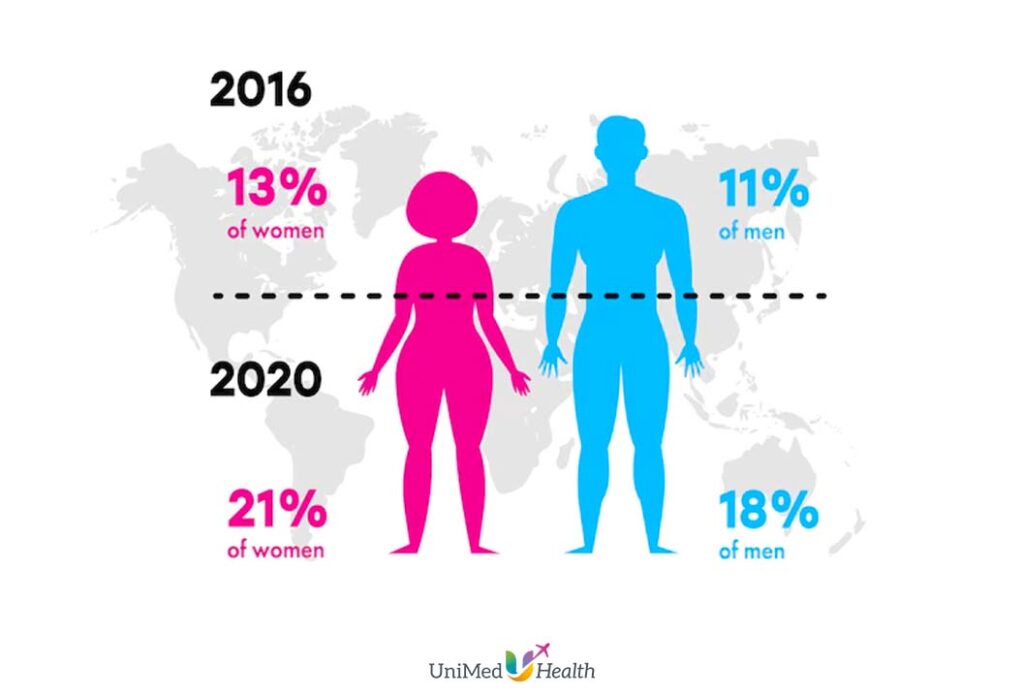
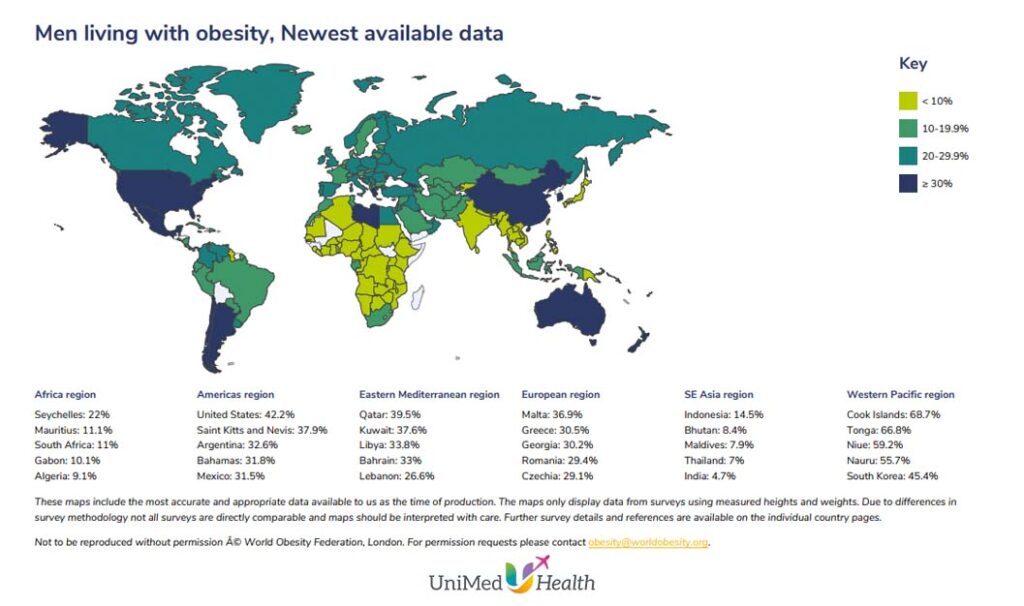
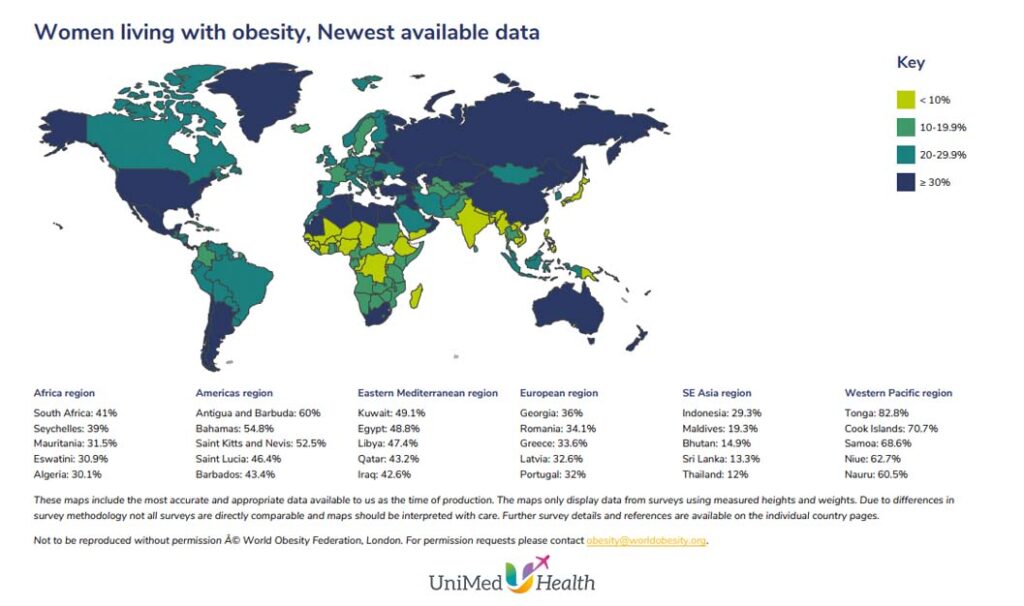
The first treatment for obesity is lifestyle changes. Lifestyle changes are a strict exercise regimen and a diet plan prepared by professionals, which are necessary for a healthy life. In some patients, it can be applied in pharmacological therapy in the presence of necessary indications. However, the results of pharmacotherapy are not very encouraging. It appears as a treatment option for obesity in bariatric surgery in patients with inadequate or necessary qualifications for these treatments.
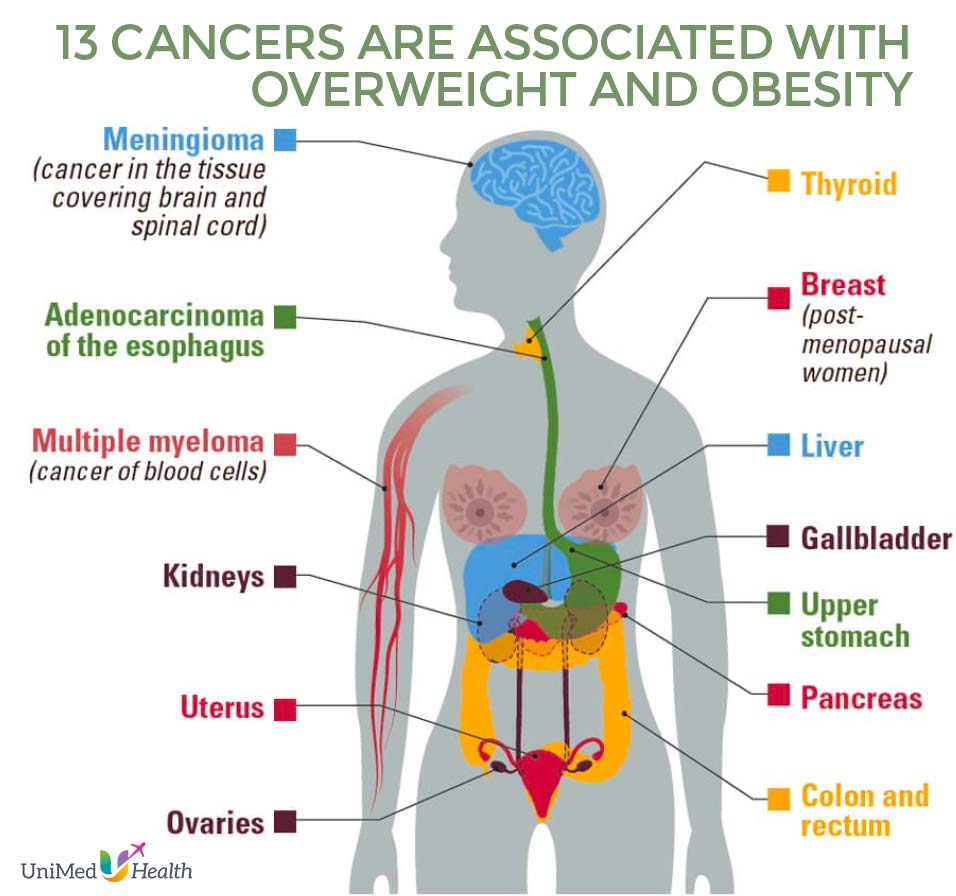
As you can see in the infographic above, although most people know the diseases associated with obesity, cancer is not one of them and obesity is a risk factor for many cancers.
BARIATRIC SURGERY
It is the surgical solution to obesity. In other words, they are weight-loss surgeries. It is an alternative treatment method for patients who meet the appropriate medical criteria and diet and exercise are ineffective. After all, since each of them is a surgical procedure in its own right, it has risks and side effects, but it can provide effective weight loss in patients in the short term. In the long term, results can be obtained with lifestyle changes. In short, although it is an ideal method to change the lifestyle to lose weight, surgical treatment continues to be the most effective and scientifically successful method in obese patients
Bariatric Surgery operations are classified under three different headings. Restrictive (restrictive food intake, gastric reduction surgeries), malabsorptive; disrupting & inhibiting food absorption (changes in the small intestine), mixed; It is both restrictive and malabsorptive. Which bariatric surgical procedures are performed by expert bariatric surgeons in our clinic are listed.
- Sleeve Gastrectomy (Read More…)
- Gastric Bypass Surgery (Read More…)
- Gastric Balloon (Read More…)
Is bariatric surgery really effective in obesity-related diseases?
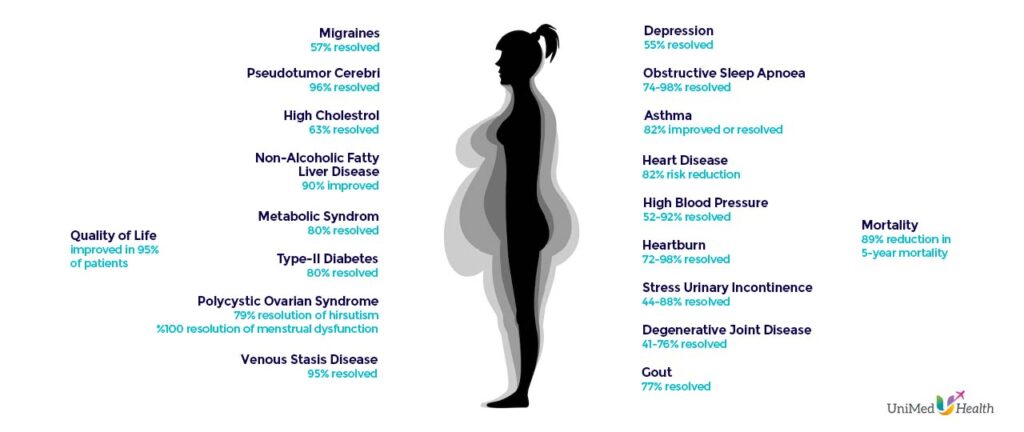
Let’s examine together the infographic showing the recovery rates in patients after sleeve gastrectomy, one of the most used bariatric surgery procedures.
It is seen that many problems such as type 2 DM, cardiovascular disease, high blood pressure, and sleep apnea are treated at a high rate according to studies. In addition, it has been observed both in scientific studies and in our clinical experiences that patients feel more self-confident and happier in psychosocial terms.
What medical criteria are required for bariatric surgery?
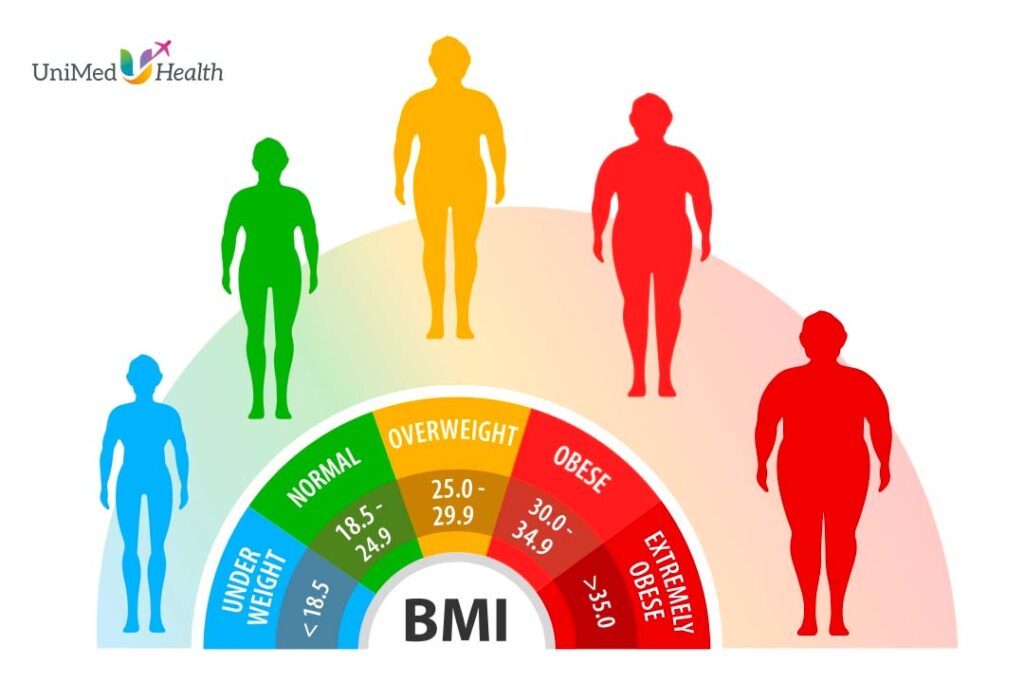
- BMI >40 kg/m2
- BMI>35 kg/m2 concomitant disease (type 2 diabetes, hypertension, sleep apnea, hyperlipidemia, obesity-hypoventilation syndrome, Pickwick syndrome (combination of the sleep-apnea syndrome and obesity-hypoventilation syndrome), non-alcoholic fatty liver disease or ” non-alcoholic steatohepatitis (NASH), pseudotumor cerebri)
- Acceptance of the risk of surgery
- Failure of non-surgical treatments
- Psychiatric stable, no alcohol. and drug addiction
- The patient is well-motivated and knows the surgery and its sequelae.
- Absence of medical problems that will prevent the life of surgery
- Absence of uncontrolled psychotic and depressive disorder
- Full support of family and social environment
CALCULATE YOUR BODY MASS INDEX
Choose your gender from the boxes below:
Enter your weight and height values in the boxes below
Which candidates are not suitable for bariatric surgery?
- Patients should be between the ages of 18 and 65, but bariatric surgery can still be considered in cases with serious comorbidity (such as T2DM, and HT).
Especially in these age groups, the decision should be taken jointly by the patients and surgeons. The surgeon makes a very careful examination for the group under the age of 18, and decides by looking at the general physical condition of the patient, and his mental state. and the benefit-harm ratio for his future life. For those over the age of 65, it is important whether the patient is in a position to bear the risks of the surgical operation, and the patient should be evaluated in terms of cardiology and lung.
- Presence of an untreated endocrine disease that causes obesity (such as Cushing’s, hypothyroidism, insulinoma)
- Presence of psychiatric problems such as major depression or psychosis
- Alcohol or substance abuse
- Not being able to adapt the patient’s diet, exercise plan, and supplementary food intake in the postoperative process
- The patient has an active cancer diagnosis
- Having lung and heart disease, which is a serious risk bar in terms of anesthesia
- Portal hypertension, Chron (especially for gastric bypass), and Gastroesophageal reflux (especially for sleeve gastrectomy) patients are not suitable for bariatric surgery.
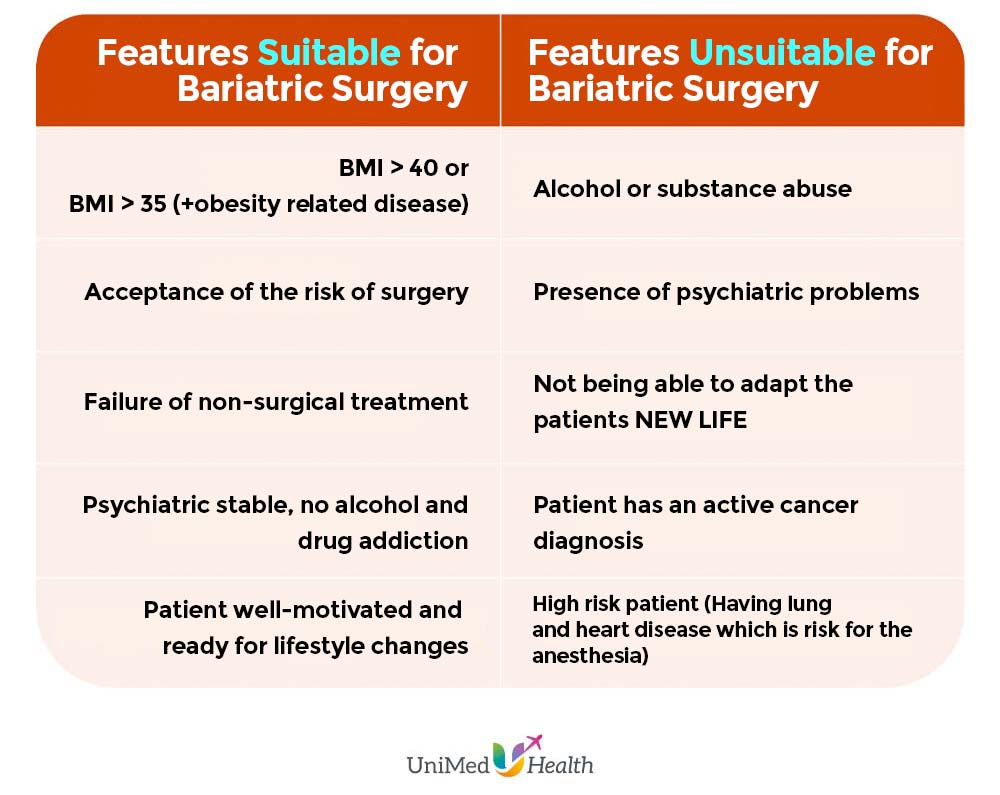
The aforementioned contraindicated conditions should be ruled out before surgery. In doing so, the patient’s medical history, clinical and laboratory data are used. In necessary cases, psychiatrists, endocrinologists. and gastroenterologists may ask for help.
Preoperative Process and Requirements

Bariatric surgery is an effective treatment method for obesity. However, if a successful outcome is desired, patients must be carefully selected. Short-term follow-up of patients before surgery is important. During this period, patients’ determination, wishes, compliance with diet and exercise therapy, and medical criteria should be reviewed. Even a small amount of weight loss in the preoperative period increases the success rate of the surgery. Therefore, we recommend our patients to be followed up by an endocrinologist for six months before surgery, although it is not mandatory.
Some requested tests before surgery are:
Cardiac Evaluation (ECG, ECO if needed)
Chest X-Ray
Blood analysis (Examinations including Complete Blood Count, Electrolyte, Biochemistry, and Serology)
Urine Analysis
Some patients with reflux symptoms may require endoscopic intervention to rule out.
In this process, you will stay in constant contact with our obesity surgeons. Our surgeons will choose the appropriate bariatric procedure for you in line with your lifestyle, medical history, obesity-related diseases, general condition, BMI, and your wishes. You should not forget that this process should be continued with transparency and solidarity between the patient and the doctor.
What should I change in my life before bariatric surgery?
After deciding on surgery;
- Talk to your doctor about your weight loss expectations, you should not have unrealistic expectations.
- You need lifestyle changes, and determination to reach your target weight. Prepare yourself mentally for this adventure
- Improve yourself in bariatric surgery, and know what awaits you after the surgery.
- Make sure you give your doctor the necessary information about the operations you have had, the drugs you use, the diseases, and your drug allergies.
- Avoid smoking and alcohol as long as you can. The more successful you are in this regard, the shorter the postoperative wound healing and recovery time will be.
- Determine a suitable diet for weight loss with a dietitian. You can also check our page for preop diet.
- To achieve and maintain weight loss goals, you must begin an exercise routine.
Considering that this issue is important, we wanted to emphasize it again. Losing weight before the surgery increases the chances of success of the surgery. The more weight we can lose, the better.
How long is the recovery time after bariatric surgery?
You can be discharged within 1-3 days after weight-loss surgeries. Recovery is complete in a short time, as bariatric surgery procedures are usually performed laparoscopically. In the presence of complications, the hospital stay may be prolonged. It may take 4-6 weeks for you to return to your daily activities, but patients with a desk job can return to their working life in an average of 10 days. However, during this period, you should stay away from activities such as heavy lifting and exercises for the wound to heal.
An overview of the recovery process
It is normal to experience fatigue, nausea, vomiting, post-operative pain, insomnia, and loss of appetite in the first days and weeks after surgery. Patients experience them to varying degrees.
Pain Management
You will feel pain due to the wound site and your position during the surgery. You can prevent your pain with the painkillers prescribed to you, but you should not use them without the advice of a doctor. The general strategy in pain management does not allow the pain to become unbearable. If your pain is around 3-4 according to the pain scale, you should take painkillers. The pain management plan includes multiple modes of treatment to reduce the need for opioids. In cases where oral opioids are prescribed it will only be the first few days after surgery. The severity of the pain will affect your daily life and it is useful to consult your doctor when it comes.
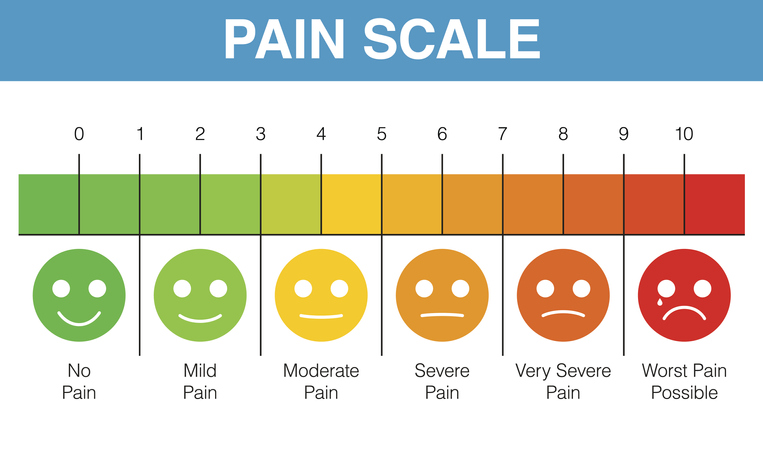
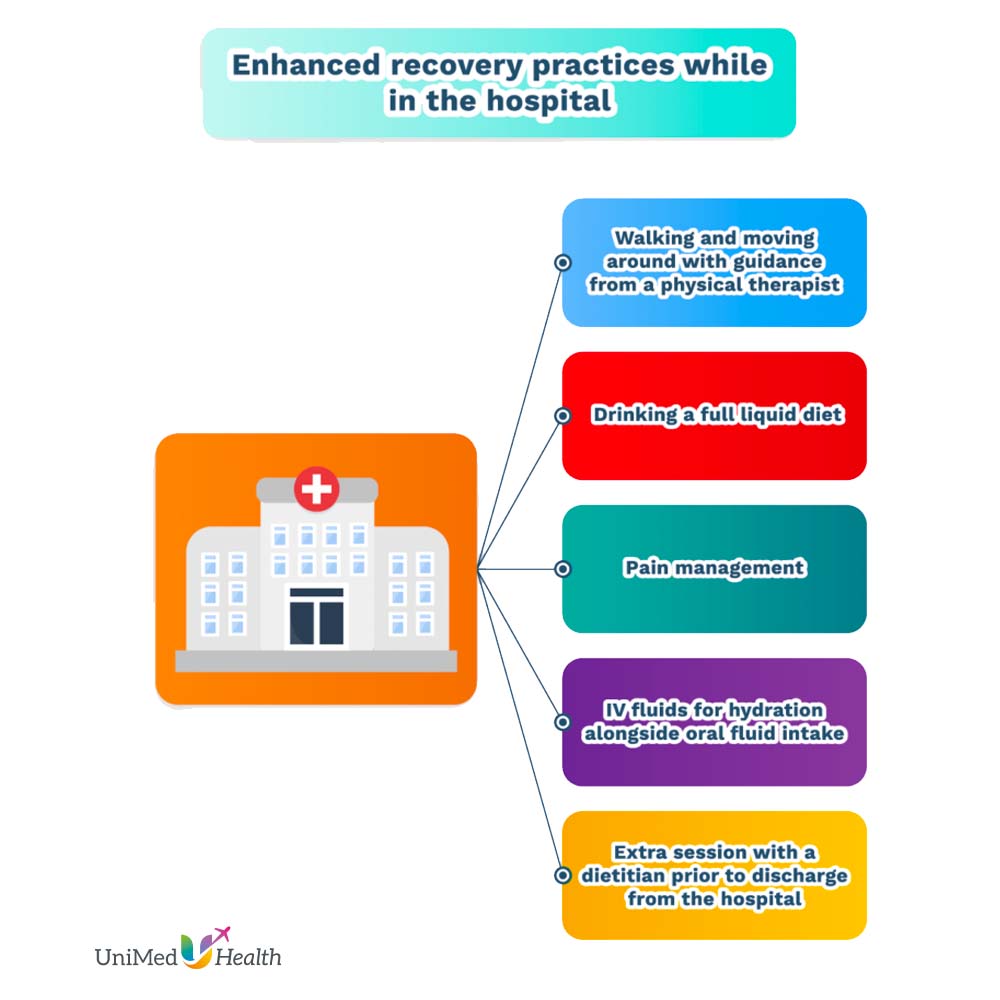
What does it take for a fast recovery?
The quickest way to shorten the healing process is to be active right away. Even walking a short distance and changing positions in bed will increase blood flow. Thus, the healing process will be accelerated and blood clot formation will be prevented.
In this process, our physiotherapists and nurses in our clinic will help you with how often and how to walk. Our nurses will also show you how to breathe and cough, and even show you how to use spirometry to help expand your lungs. In fact, it is not unreasonable to practice breathing exercises before surgery to improve your lung function. With this exercise, the secretions accumulated in your lungs will be eliminated, the risk of post-operative pneumonia will be reduced, and the anesthesia given during the surgery will be eliminated quickly.
Wound Care
Because many bariatric procedures are performed with the closed method, the incisions and healing are short-lived. There are sutures under the skin at the incision sites and surgical adhesive on the wound lips. These adhesives are shed spontaneously within an average of 10 days. After spilling, creams that will accelerate the healing and epithelization of the wound can be used with the advice of a doctor. It is normal for a small amount of yellow and clear liquid to flow from the wound. Wound infections usually occur 3-10 days after surgery. If there is a foul-smelling discharge, redness, pain, and swelling at the incision site, it is recommended to contact our bariatric surgeon.
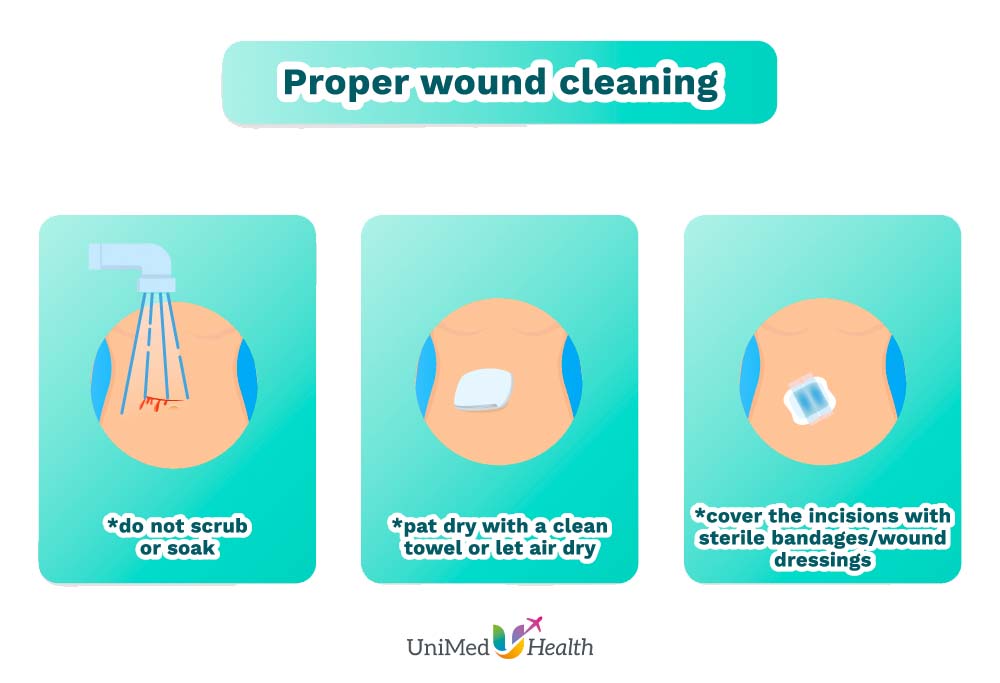
Diet and supplements after bariatric surgery
In fact, this part is as important as the surgery itself. We expect lifelong commitment from patients after bariatric surgery. The success of our operation depends on you. That’s why you should follow the diet plan given to you. To read in detail
Weight Loss Expectations
Postoperative weight loss rates of individuals; It varies according to the type of operation performed, the gender of the person, the weight before the operation, the fat ratio, the edema status, and the post-operative diet. and physical activity status. If you follow the plan given to you after the surgery, weight loss is inevitable.
You can examine the post-operative weight loss expectations in detail on the pages where surgical procedures are reviewed.
To our patients,
We want you to know that we will enjoy being with you during this process. If managed with discipline and determination, the results will be better than expected. In our opinion, reading this blog is the first step towards your new life where you will be more active and happier. As UNIMED, we are always with you with our expert team and we look forward to showing you this. Do not hesitate to consult us with any questions you may have. We are here for you every moment of the day. To the first journey of your new life …
Regards.

